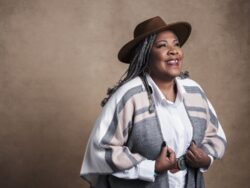
About our guest author: Melody Starya Mobley’s experiences as the first black woman serving as a forester for the USDA are remarkable: both for the firsts she embodies and for the years of abuse and oppression she experienced within that system.
Now, Melody shares her personal stories to create positive change for groups historically excluded from accessing American natural spaces.
With the few federal protections that exist currently being stripped away, it’s more important than ever for stories like these to be told. To read more of Melody’s writing, visit her website.
Image credit: Kirth Bobb
I worked for the USDA Forest Service for 28 years. During that time:
- I was repeatedly sexually and physically assaulted.
- My reputation was maligned.
- I was passed over for promotions.
- My choice of work assignments were taken from me and given to colleagues.
- I was denied training opportunities.
- I suffered other abuses that created a hostile work environment.
Not all my time in the Forest Service was negative, but the bad tended to outweigh the good—so, why did I stay?
The USDA offered security, fulfillment and purpose.
At first, I stayed because they offered me a permanent job while I was still in college. My mother and grandmother had huge medical bills associated with their overlapping diagnoses of terminal cancer: I needed reliable pay, no matter who offered it.
Once I was in the field, I mostly enjoyed forestry work. Completing assignments like tree planting, stand exams, laying out timber sales, etc., could be repetitive. But the locations of the work were beautiful, and I loved being outside most of the time.
When I worked in the Washington Office headquarters, I was helping to make policies and enjoying other work with national significance. I believed this was the way I could have the most positive effects on the environment.
The USDA was also something to survive.
1. Protection through mentorship
But, given the culture of hostility, how did I survive in the Forest Service? I had excellent, White male mentors to advise me throughout my career. Their credibility in the agency made them effective in protecting me from some of the negative actions along the way.
2. Battles fought on the record
And when I had no other option, I filed Equal Employment Opportunity complaints against the Forest Service. I’m under a nondisclosure agreement, so I can’t say much—but the complaints were settled in a satisfactory manner. However, this was always the last choice. In a sense, the complainant may win the battle but always eventually loses the war unless larger changes are made by workplace authorities.
3. Modeling others to blend in
The Forest Service is a large, militaristic, predominantly White male organization; until that changes, people of color, women, and others who are not White males will never truly have a fair chance to succeed in the USDA Forest Service. To even get by, these groups must model white male behavior to avoid antagonists as best they can.
We can find success despite so many obstacles.
Most of all, I wanted to pave the way for other people of color, women, and environmentalists to survive—and maybe even thrive—in the Forest Service. Not much has changed, in forestry or other fields. Others still stay at challenging jobs for the same kinds of reasons: family pressures, financial constraints, and finding stability.
I’ve served as a mentor and role model for many. On numerous occasions, people told me I was the reason they made it in the Forest Service. I’m serving as the subject of a documentary film about my life as the first African American woman forester in the USDA Forest Service to try to reach more people, and I hope telling my stories will offer hope that we can find success in work despite any obstacles stacked against us.
“We need to have some leaders of color, so people can see that ‘well, she’s doing that. I could do that too.'” — Melody Starya Mobley
![]()
Read more of Melody’s writings
on the American Green blog.
